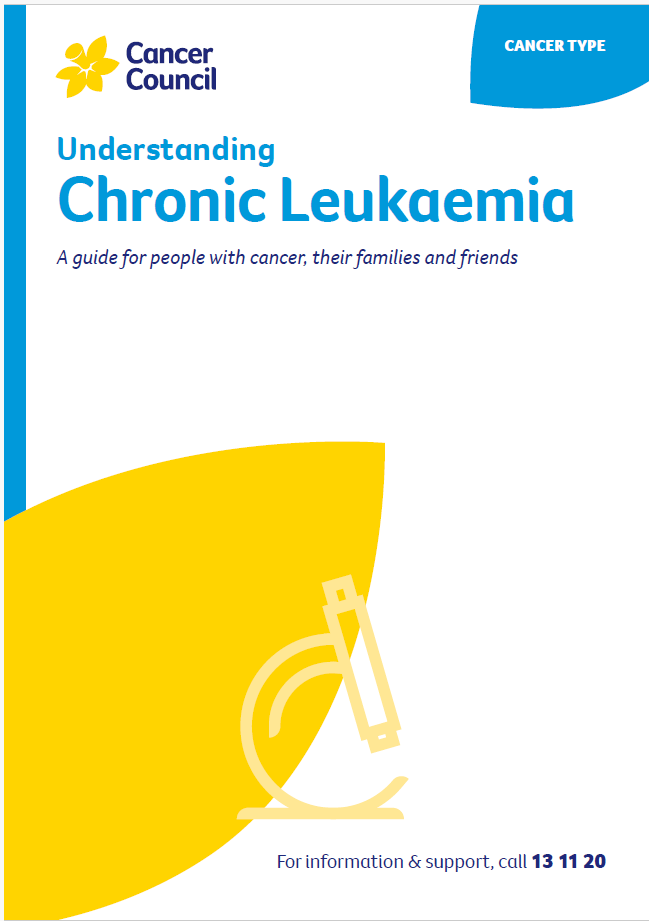- Home
- Chronic myeloid leukaemia (CML)
- Treatment
- Other treatments
Other treatments for CML
The main treatment for chronic myeloid leukaemia (CML) uses tyrosine kinase inhibitors (TKIs), a type of targeted therapy. Chemotherapy is sometimes used as well.
Learn more about these other treatments:
- Immunotherapy
- Stem cell transplant
- Supportive treatments
- Video: What is immunotherapy?
- Podcast: Explaining immunotherapy and targeted therapy
Immunotherapy
Immunotherapy aims to change how your immune system responds to the leukaemia. The immunotherapy drug interferon alfa was the main treatment for CML before TKIs were developed.
Although this drug is not used very often now, it’s being used in some clinical trials to see whether people can stop their TKIs. Interferon alfa is also used in people who are pregnant and can’t have TKIs.
Stem cell transplant
This treatment is not used often for CML, but it may be offered to some people with accelerated-phase or blast-phase CML that has stopped responding to TKIs, or to people whose disease is not controlled with chemotherapy.
A stem cell transplant involves destroying the leukaemia cells with very high doses of chemotherapy or radiation therapy. This can also damage the stem cells in the bone marrow. A stem cell transplant can help restore the bone marrow and rebuild the immune system. The stem cells are usually collected from another person (allogeneic transplant).
A stem cell transplant is a demanding treatment and isn’t suitable for everyone, especially older people. Your doctors will tell you if a transplant might help. Transplants are not done at every hospital, so you may need to travel to have this treatment. Your medical team will explain transplant procedures for your situation and possible side effects. There are several stages of treatment, and the whole process may take many months.
For more information on stem cell transplants for CML, see the Leukaemia Foundation.
Supportive treatments
Less commonly, your doctor may recommend other therapies to manage some of the symptoms and side effects of CML.
Allopurinol tablets
If your white blood cell count is very high, a chemical called uric acid can build up in the blood during treatment. This can cause red, painful and swollen joints (gout) and may damage your kidneys.
You may be prescribed tablets called allopurinol, which prevent gout by helping your kidneys to get rid of uric acid.
Leukopheresis
You may have a very high number of white blood cells (for example, during blast- phase CML). The extra blood cells can block blood vessels and cause problems.
A procedure called leukapheresis can quickly reduce your white blood cell count to a safer level.
You may have leukapheresis to control symptoms, not to treat or cure the disease.
During the leukapheresis procedure, your blood passes through a machine that takes out the white blood cells and returns all the other blood cells and plasma back into the bloodstream.
- You will have a needle or tube called a catheter inserted in each arm.
- One tube removes your blood and passes it through a machine that separates the blood into its individual components.
- The extra white cells are removed, and the rest of the blood components are returned to your body through the second tube in a continuous process.
- This process can take 2–4 hours.
Only about 250 ml of your blood is outside your body at any one time. Leukapheresis is not painful, but some people find having the catheter put in uncomfortable.
→ READ MORE: Palliative treatment for CML
Video: What is immunotherapy?
Watch this short video to learn more about targeted and immunotherapy.
Podcast: Immunotherapy & Targeted Therapy
Listen to more episodes from our podcast for people affected by cancer
More resources
Dr Chun Kei Kris Ma, Clinical Haematologist, Western Sydney Local Health District (clinical update); Delphine Eggen, Consumer; Dr Robin Gasiorowski, Staff Specialist, Haematology, Concord Hospital; Karl A Jobburn, Haematology Clinical Nurse Consultant, Liverpool Hospital; Yvonne King, 13 11 20 Consultant, Cancer Council NSW; Heather Mackay, Clinical Nurse Consultant, Westmead Hospital; Jennifer Paton, Consumer.
View the Cancer Council NSW editorial policy.
View all publications or call 13 11 20 for free printed copies.

